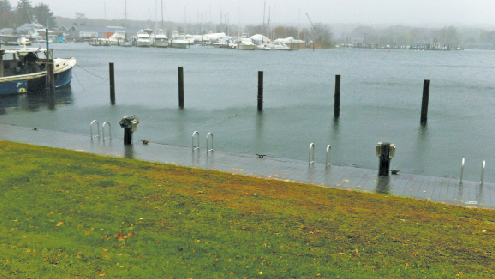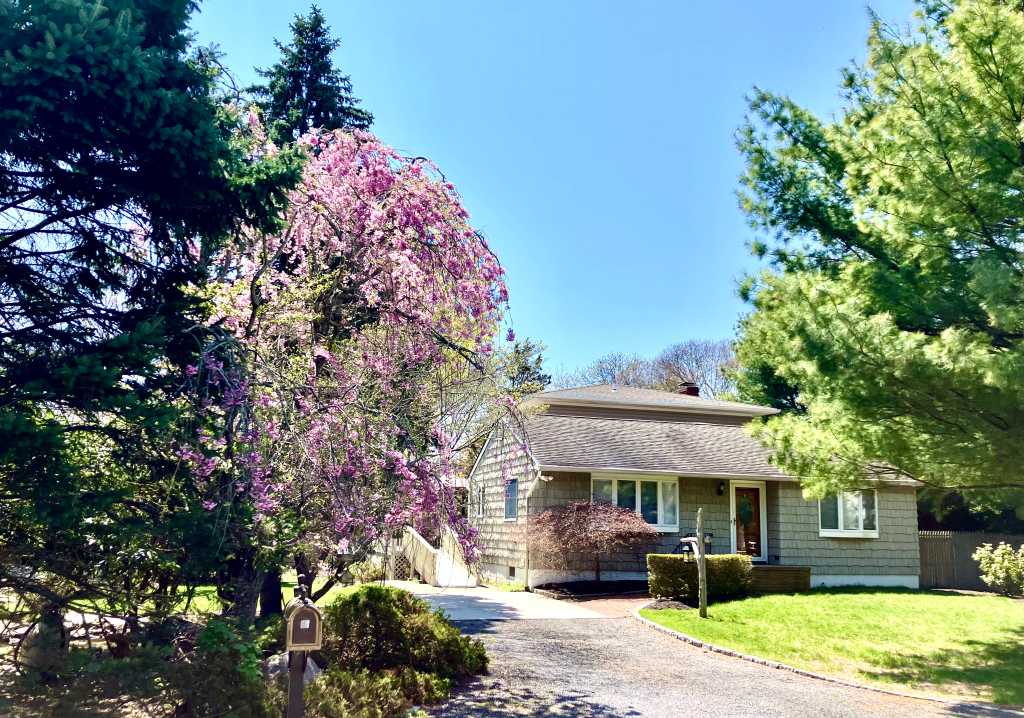Harbor Rising: A Small Story About Hurricane Sandy and Three Mile Harbor

In 1986, my home on Three Mile Harbor Road burned to the ground. We were not home at the time, thank God. My kids were in school, my wife off shopping. I will, for as long as I live, remember the exact conversation I had when a fireman called me at work in Bridgehampton.
“There’s a fire at your house. You need to come here.”
“Is it bad?”
“Yes.”
The Springs Fire Department fought it bravely for hours, but it was no use. My wife and I watched. She cried. I was too stunned. Flames were shooting out the windows. In the end, the roof collapsed and only a few walls stood. There is nothing like watching your life burning up.
I would not give up on this property, however. When I first saw it, I fell in love with it. I’d often stop, as did lots of people, to watch the sun set over the boats in front of it there on Three Mile Harbor Road. In 1975, a “For Sale” sign had appeared in front of the house there. I immediately bought it for the asking price. The house was perched on the side of the hill. On the other side of the road, the boats, 36 of them in numbered slips, sat in the water in a long, neat row facing a long, narrow public park. It was 30 feet wide. Benches on its lawn faced the water. Off in the distance, across the harbor, was the Northwest Woods. On sunny days, year-round, the sun set over Northwest, and the house on the side of the hill was the last piece of property in the area that received it. I’d drive up the street toward home to see this colorful sunset seemingly blessing the house with sunshine in a landscape already darkening. Coming inside, I’d notice the rays of the sunset, having bounced off the harbor, now splaying in interesting patterns on ceilings of the rooms inside.
I had offers for this property while the old house lay in smoldering ruin. But I turned them all down. I would rebuild. And I did. Which brings us to the present day, 26 years later, on Monday, October 29, 2012, the day of the arrival of Hurricane Sandy.
Everyone has a story to tell about this hurricane. Some horrendous, some not. This is mine.
On that Monday morning, I began to realize I had seriously miscalculated what was about to happen. Up until that time, I had my eye on the ball, which was the eye of this hurricane heading our way from somewhere off the coast of North Carolina. I could watch it on the Weather Channel on TV.
People talked about the great size of this storm, but in prior storms, no matter how great the size, the most damage done was right where it crossed over land for the first time. By Monday morning, however, it was clear the storm would not hit the Hamptons, it would hit the New Jersey shore, or perhaps northern Delaware. When it hit there, surely it would not be much of anything here.
My wife and I have a place in the city. We could have gone there. But, on that morning, we made our final decision that we’d be better off overlooking the harbor in East Hampton for the duration. We could be here to watch over the house. There could be flooding rains. There could be high winds, or a tree down. We should be here.
I should describe the mathematics of this house at this time. It will become relevant for the rest of this story, because we never thought it would be possible for the water in Three Mile Harbor to reach the house.
The new house I built to replace the old here sits at an elevation of 17 feet. The distance from the living room sliders, across our front deck, front lawn and street, then down the hill across the grass of the park to the seawall, is 74 feet. I know this because the survey I had made when I was planning the new house showed this. We felt we would be okay with this.
And so, on Monday morning, we were watching a weather channel on TV and suddenly I knew there was something else, something completely unexpected at hand.
“With this air view, you can see this huge swirl of clouds circling counterclockwise 150 miles around the eye of the storm slowly moving northward,” pointing to it on a large map. “Under it is an enormous, elevated surge of water, created by the eye of the storm digging its hole in the ocean. When this storm comes north to hit New Jersey, this surge of water also comes north and will be driven from east to west into Montauk Point. It will split there. One part will surge north around the side of the lighthouse and head west into Long Island Sound to pile up against Manhattan. The other part will surge along the southern shore of Long Island to also pile up against Manhattan. We expect this surge when it meets back up to be about 10 feet high. It could breach the walls of lower Manhattan and enter the subways. A disaster.
It occurred to me as I contemplated the fate of Manhattan, that the weatherman had left out a middle part. This water would also surge between the North Fork and South Fork and come right up Peconic Bay into, among other places, Three Mile Harbor. The surge would reach its height at midnight. But midnight was our high tide. And it coincided with a full moon. This was incredible news.
Well, it was now too late to evacuate. The wind was screaming. Trees were coming down everywhere. And soon thereafter, at 4 p.m., all the power went out leaving us all alone in the howling storm.
At 6 p.m., just before sunset, I looked out from our living room to see the harbor begin spilling over the sea wall and onto the grass of the park. I had never seen it do this before. It was raining sideways. The trees on our property were swaying, and against all common sense, I again went out onto our front deck to briefly look down at it. It was oddly warm out. Skies were grey. It was time for sunset, but there wasn’t any. The few boats tied in their slips were now separated from shore
by water.
At that moment, a pickup truck pulled off the road and parked by the curb in front of one of the boats. Two men in waders emerged from the truck, carrying planks of wood. They splashed through the few feet of water on the lawn, boarded their boat, a commercial fishing boat, and were soon nailing other pieces of wood to the tall pilings, extending them upward four more feet. If the surge was higher than the pilings, the extra wood could still hold the boat in place. The job done, the men splashed back through the grass and drove away.
Half an hour later, with the wind still screaming, I ventured out again to our front deck. I wanted to see the harbor before night fell. The boat and the few others remaining were now rocking 10 feet from the edge of the water on the grass. The harbor was on
the move.
In the darkness of the rest of the evening, we read by flashlight and listened to a battery-powered radio. There was nothing to see out our window. The usually bright streetlights were dark. You could just barely see the shadows of the boats rolling in the chop.
I thought about what we might do if the water reached the house. We could abandon it, and scramble further up to the top of the hill where a retired New York City Legislator had in recent years built a beautiful home. He was almost never there, though, and so we’d be trespassers if we got in. Maybe it would be locked. Well, maybe it would be better if we just sat in our car, parked in the lot in back of our house. I imagined the car, lifted up, rocking back and forth.
“If it gets really bad,” I said to my wife, “we could retreat up to the second floor.” I was referring to our house.
At 11:30 p.m. I put on my raincoat.
“Don’t do that,” my wife said.
New York City’s underground systems had been breached. The water was pouring in. The surge had not been 10 feet. It had been more than 12 feet. A record. And it was still climbing. I thought more about this. I sat back down.
And then, suddenly, just after midnight,
right at the peak of our high tide, the howling winds outside suddenly died. It also stopped raining. It was quite amazing. I turned off
the radio for a moment. It was deadly silent
out there.
“I have to see where the water is,” I said, grabbing a flashlight. And I was out the door and down the driveway. It had not reached the road, thank God. I walked across it. But then, just a few feet beyond it, almost all the way up to the road, was the harbor, all black and still, filling the park. In the moonlight, I could see it was flat as a mirror. Off in the distance, the fishing boats floated offshore.
At that moment, the pickup truck I had seen before came along, slowed, turned 90° toward the water, stopped and shined its headlights on the fishing boat. The back end of the truck stuck out a bit into the road parked that way. But it was okay. It sat there awhile, its radio playing. So I walked over to the passenger’s window.
“Your boat?” I asked.
“Nope. My brother’s.”
“Ever see anything like this?”
“Never. We’re here to report back.”
The two men were Bonackers, among the many descendants of the original settlers who came to this place in the 17th century, and they still live nearby.
It was an extraordinary encounter. It was dark, quiet. Our house was behind us. The waters of the harbor, inky black, still, right at our feet. The radio in the car played a country western song.
“What do you think is going to happen?” I asked. I thought they would know.
“I think this is it,” one of them said. “Tide’s high. Wind is down. All this water, pushed up, now no reason to stay here. It’s all over.”
I considered it. Trillions of tons of the sea, shoved in against us, now about to fall suddenly away.
After awhile, I returned to the house and soon my wife and I went upstairs to sleep. At 7 a.m. I woke up, opened the bedroom curtains and looked out. Below us, in bright sunlight, the harbor was back behind the seawall where it was supposed to be, 74 feet from our window. I came back to bed and wearily and happily climbed in under the covers.
The electricity came back on two days later. By this time, I had learned of the great catastrophe that had struck the city and the Jersey shore. We were lucky out here. This was just my small story. And, as they say, there but for the grace of God, go I.



